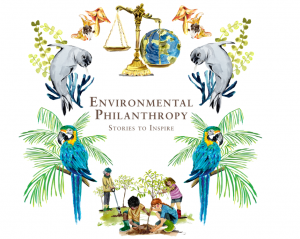For more stories from Beacon’s network of philanthropists
27 Stories of Success from the Environmental Funders Network.
The Environmental Funders Network (EFN) has released an illustrated booklet of case studies to showcase pathways into environmental funding.
The 27 stories of network members, including individuals and trust and foundations, demonstrate the transformative potential of philanthropy. This work not only showcases pathways to new and increasing philanthropy for those that wish to support environmental causes but also offers valuable insights into all philanthropic efforts and best practice in giving.
The stories in Environmental Funders’ publication also show that green philanthropy works and has a unique role; it can be used to take risks, provide charities with long term support, fund projects that other sources of funding would not touch, and test out ideas that can be scaled up. The grants in these stories ranged from £5,000 to millions of pounds, and in each instance, their support had a transformative effect.
There is also an interesting page on “I’m new to environmental philanthropy, where do I start?” where contributing members have given advice to newcomers, explaining their philanthropic roadmap and top tips.
This includes:
“It is not necessarily about the amount you give, it is about where those funds will make the most difference. Even modest grants can have a huge impact in certain areas. Talk to other funders who can share advice on how funds can be best used.”
And
“Work with the best people you can find. Gather positive minds. Your first step might fill you with fear, but your next may make you smile with quiet satisfaction. Later, privately, you can glow with pride. You did your bit to make the world a better place.”
Advice which is not cause specific but is applicable to any philanthropic effort.

Overall, the Environmental Funders booklet establishes that:
- Even a comparatively small amount of funding can have a tangible impact, particularly when it can be used to lever in much larger amounts from other sources.
- Sustained support over many years can ensure that a project not only gets off the ground but can grow into something much bigger and more successful than originally envisaged.
- Funding collaborative initiatives between different organisations working towards a common goal can significantly increase their collective impact.
- Collaborating as funders to increase the investment in a particular initiative can help to get it over the line – and build confidence among other funders to donate more.
- Compelling successes have resulted not only through funding specific projects or initiatives, but – perhaps more often – through providing unrestricted or core funds to an organisation to allow staff the flexibility to spend them in the most strategic way.
- Just because a particular issue receives very little funding now doesn’t mean it isn’t important, and funding can enable work that helps to demonstrate just how critical it is.
- Place-based initiatives are much more likely to be successful if they work with, and ideally directly benefit, local communities to ensure their buy-in and support’.
- Taking a gamble on an ambitious or innovative approach will at the very least generate valuable lessons learned – but could pay huge dividends.
The report can be found here and a recording of the launch event with actor Sir Mark Rylance, Springwatch presenter Gillian Burke, and three of the funders whose stories feature in the publication – Kevin Cox, Sophie Marple and Ben Goldsmith can be found here.
EFN’s mission is to increase financial support for environmental causes and to help environmental philanthropy to be as effective as it can be. Its members are funders, mainly based in the United Kingdom, who pursue these aims at home and overseas. Funders interested in joining EFN or finding out more about the network should contact EFN using the contact form at www.greenfunders.org.
